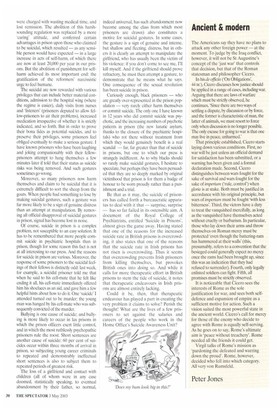Ancient & modern
The Americans say they have no plans to attack any other foreign power — at the moment. To judge by the Iraq conflict, however, it will not be St Augustine's concept of the 'just war' that controls that decision, but that of the Roman statesman and philosopher Cicero.
In his de officiis (On Obligations', 44 Bc), Cicero discusses how justice should be applied in a range of cases, including war. Arguing that there are laws of warfare which must be strictly observed, he continues, 'Since there are two ways of settling a dispute, by discussion or by force, and the former is characteristic of man, the latter of animals, we must resort to force only when discussion is no longer possible. The only excuse for going to war is that one may live in peace, unharmed.'
That principle established, Cicero starts laying down various conditions. First, no war will be just unless an official demand for satisfaction has been submitted, or a warning has been given and a formal declaration made. Second, Cicero distinguishes between wars fought for the sake of survival and wars fought for the sake of impetium ('rule, control') when gloria is at stake. Both must be justified in accordance with his original principle, but wars of imperium must be fought 'with less bitterness'. Third, the victors have a duty to treat the vanquished mercifully, as long as the vanquished have themselves acted without cruelty or barbarism. In particular, those who lay down their arms and throw themselves on Roman mercy must be protected 'even though the battering-ram has hammered at their walls' (this, presumably, refers to a convention that the besieged could generally expect no mercy once the rams had been brought up, since this was an indication that they had refused to surrender). Fourth, only legally enlisted soldiers can fight. Fifth, all promises must be strictly observed.
It is noticeable that Cicero sees the interests of Rome as the sole justification for war, and sees both selfdefence and expansion of empire as a sufficient motive for action. Such a vision suited the most powerful state in the ancient world. Cicero's call for mercy for those of the enemy who decide to agree with Rome is equally self-serving. As he goes on to say, Rome's ultimate aim is 'peace without treachery'. Rome needed all the friends it could get.
Virgil talks of Rome's mission as 'pardoning the defeated and warring down the proud'. Rome, however, decided who fell into which category. All very von Rumsfeld.
Peter Jones










































































 Previous page
Previous page